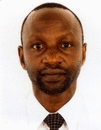Message from Executive Director
AICAD's website has been developed with a view to providing information about the Institute and offering regular updates on key developments revolving around its mandate.
AICAD seeks to position itself as a Centre of Excellence by continuing to work tirelessly towards fulfilling its mandate which is aimed at reducing poverty in Africa by implementing and supporting various human capacity development initiatives. These initiatives are undertaken within AICAD's three robust functional divisions of Research and Development, Training and Extension and Information Network and Documentation which are well designed to conduct targeted investigations, training and the collection, processing and storing of relevant information from various sources to be disseminated for empowerment of communities. AICAD's activities are based on needs assessment studies that identified key thematic areas which include agriculture, environment, value addition, health equity, planning, poverty surveillance, projection and sustainable development.
The Institute's programmes and activities continue to be enhanced through its collaboration with both governmental and private organizations such as universities, Research Institutions, Industries, NGOs, CBOs and Government Departments and Agencies within and outside Africa. AICAD leverages on human resources and other suitable facilities in these institutions through partnerships.
In this way, AICAD has been able to execute her mandate over the years from inception in 2000-to-date by partnering with key excellent universities, institutes and research organizations supported by donors and the governments of Kenya, United Republic of Tanzania and Uganda. It would be appropriate to mention a number of key donors and partners that AICAD has worked with including JICA, World Bank, European Union, Wetlands International, United Nations Development Program (UNDP), and United Nations Centre for Regional Development (UNRCD), UN-Habitat and many others. At present, AICAD is working towards ensuring that this firm foundation is maintained not only through the strengthening of these partnerships but by engaging with and bringing on board additional strategic collaborators.
In a bid to champion and station herself in a position that is a true reflection of the Institute's name which reads “African Institute for Capacity Development” AICAD is making efforts towards a presence that spans the whole continent of Africa. The Institute's programs and activities have recorded a measure of success towards achieving this goal. This is illustrated by the fact that some of the Institute's training courses have gone beyond the east African region and have involved other African countries across all its regional blocs, thus measuring up to the requirements of training integration needs in Africa.
In keeping with African Union Agenda 2063, AICAD is out to promote speedy integration and fulfill the expectations of researchers by linking knowledge to application within communities in order to reduce poverty on the continent beyond the Institute's current operational area that covers the member countries namely Kenya, Tanzania and Uganda. AICAD anticipates success in negotiations that are underway to reach out to all member states of East African Community and thereafter to extend to countries within ECOWAS, SADC and North Africa. In this way, AICAD should be able to become the leading centre and institute to cooperate with in areas of human capacity building and research endeavors.
AICAD's core values are hinged on partnership, equity, empowerment, excellence and responsiveness. Gratitude should be extended to the Institute's Governing Board whose primary mandate is to provide governance oversight in ensuring that AICAD functions to the highest standard in executing its mission. In order to do this effectively, the Governing Board, which is chaired on a two year rotational basis by the Permanent Secretaries of the Education Sector in the member states has delegated the day-to-day management of the Institute to the Executive Director who is assisted by the Management Committee based at the Secretariat located in Juja, Kenya.
The Institute's activities in its member countries are coordinated by Country offices housed by some of the partnering universities, which are Egerton University in Njoro, Kenya; Sokoine University of Agriculture in Morogoro, Tanzania and Makerere University in Kampala, Uganda. Partner Institutions come together in a consortium of an Annual General Meeting to receive and accept plans and policies set by the Governing Board for the smooth and proper running of AICAD affairs.
AICAD encourages you to visit this website regularly and travel this exciting journey with us.
Prof. Dominic Byarugaba
Executive Director, AICAD

